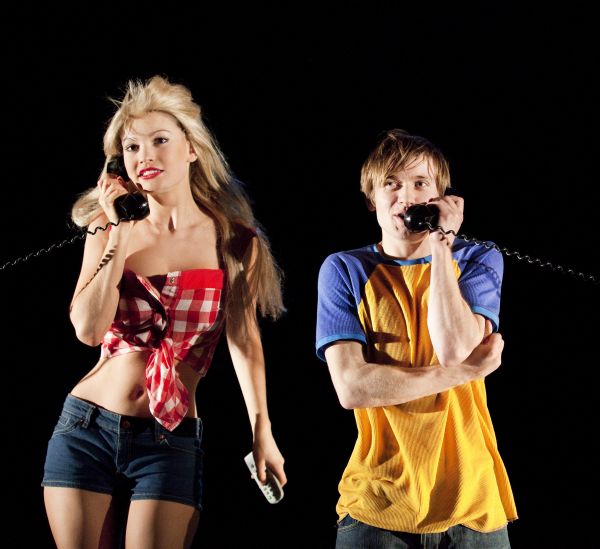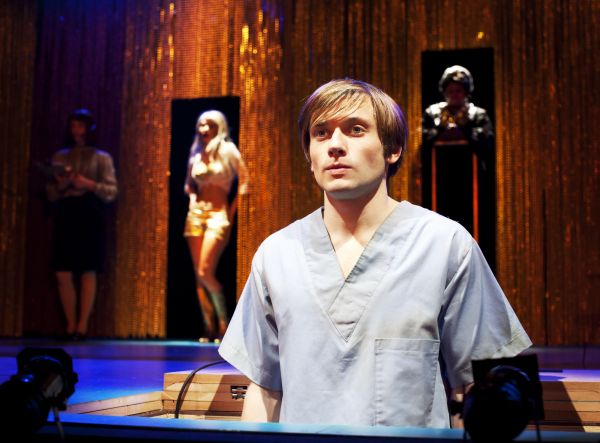Vernon God Little, Young Vic | reviews, news & interviews
Vernon God Little, Young Vic
Vernon God Little, Young Vic
The grubbiest of Booker Prize-winners gets its face washed in this adaptation
A whiff of excrement hangs around DBC Pierre’s Booker Prize-winning Vernon God Little. It’s a novel that likes to get right up into the crevices of society and then inhale deeply. Written in an anarchic, freewheeling American patois, it’s the inner voice of Vernon himself (and Pierre’s brutal way with a simile) that plays shock and awe with the reader, delighting many and appalling more. The loss of narrative voice would seem enough to deter any would-be theatrical adaptor, but in 2007 Tanya Ronder and the Young Vic took up the challenge. The result (newly revised) now makes a return – shotgun in one hand, the other down its trousers.
“I went to Martirio and all I got was this lousy exit wound.” Vernon Gregory Little is having a bad day. His best (and only) friend got caught in ladies’ underwear, went on a killing rampage at their high school, then shot himself. Students and teachers are dead and everyone’s blaming Vernon. And then there’s the small matter of his bowel “inconvenience”.
Delighting in the gun oil and fried-chicken grease stench of the white-trash South, DBC Pierre’s atmosphere clings intrusively. Rufus Norris’s production gestures toward this haphazard squalor with his deconstructed set; sofas, shopping trolleys and office chairs become cars with the simple addition of a fluorescent steering wheel or an elaborately decorated windscreen. Sets and props are mounted on wheels, sidling onto stage or manoeuvring as needed, facilitating the fractured, fast-paced chaos of Act One. Yet for all its makeshift ingenuity, there’s something a bit too clean about everything. Perhaps it’s the necessarily minimal approach, but nothing really has that sweat-stained, sauce-spilled, lived-in patina that you’d expect.
 The cast don’t help matters by being altogether too thin and good-looking. Some of Pierre’s most inventive language is lavished on the paunchy flesh-spill of the Martirio ladies and their domestic aspirations (the fabled “almond on almond” fridge makes only a cameo appearance), and while the vulgarity is successfully underplayed, this dramatic restraint surely requires some counterbalance in the visuals.
The cast don’t help matters by being altogether too thin and good-looking. Some of Pierre’s most inventive language is lavished on the paunchy flesh-spill of the Martirio ladies and their domestic aspirations (the fabled “almond on almond” fridge makes only a cameo appearance), and while the vulgarity is successfully underplayed, this dramatic restraint surely requires some counterbalance in the visuals.
Ronder’s work is scrupulously faithful, favouring original dialogue where at all possible. The result feels more like a reorganisation than a true adaptation, with changes and additions largely worked into the show’s direction. Most striking is the country and western score that has been extrapolated from the book. The cast (in patented Young Vic style) prove themselves adept on any number of instruments – singing, playing and line-dancing with slickly choreographed ease. The courtroom scene degenerates into a surreal country opera, presided over by Johnnie Fiori’s glorious soul diva of a judge.
Following the original production’s success, the Young Vic have once again chosen a Vernon making his professional debut. In his portrait of the modern picaresque hero (whose idols are Eminem, Kanye West and the like) Joseph Drake (pictured above with Lily James as Taylor) lurches from zeal to cringe, a swaggering rapper whose heroic destiny melts under the corrosive drip of society. It’s a shockingly assured performance, carrying the show through its (overlong) three-hour duration.
While I didn’t quite feel the rage of the mother-son dynamic, Clare Burt’s damaged Doris is pathetic and horrific in equal measure, balanced by the sunny block capitals of Fiori’s Pam. Taking on both of Vernon’s women – the feral Ella and milk-fed beauty Taylor – Lily James also impressed, though perhaps most in the winsome directness of the former.
 It’s a tough book in so many ways, but the problem that lingers most pervasively in this adaptation is one of tone. The rather complicated denouement thwarts any attempt to cut characters, leading to a hectic, headlong rush of an expositionary first half. Atmosphere is matter-of-fact (not aided by one of Norris’s few additions – the silent role of dead shooter Jesus with his guitar) and doesn’t quite square with the extravagant operatic pathos cultivated in Act Two. Part of the fault does admittedly lie with Pierre; JM Coetzee has already done the God/Dog thing and with more artistry. The sudden turn to quasi-religious catharsis feels insufficiently prepared.
It’s a tough book in so many ways, but the problem that lingers most pervasively in this adaptation is one of tone. The rather complicated denouement thwarts any attempt to cut characters, leading to a hectic, headlong rush of an expositionary first half. Atmosphere is matter-of-fact (not aided by one of Norris’s few additions – the silent role of dead shooter Jesus with his guitar) and doesn’t quite square with the extravagant operatic pathos cultivated in Act Two. Part of the fault does admittedly lie with Pierre; JM Coetzee has already done the God/Dog thing and with more artistry. The sudden turn to quasi-religious catharsis feels insufficiently prepared.
Martirio is, after all, a world where the two forces underlying all life are not good and evil but “cause and effect”, where folk are “bothered” by the shootings but not stirred to either anger or compassion. An exhilarating anti-parable for a post-religious age, Vernon God Little preaches obscenity and wit from a neon plastic pulpit. Irreverent and energetic, Norris and Ronder have fashioned a plausible production, lacking only perhaps the urgency that spurts prematurely from Pierre’s novel.
more Theatre
 Banging Denmark, Finborough Theatre review - lively but confusing comedy of modern manners
Superb cast deliver Van Badham's anti-incel barbs and feminist wit with gusto
Banging Denmark, Finborough Theatre review - lively but confusing comedy of modern manners
Superb cast deliver Van Badham's anti-incel barbs and feminist wit with gusto
 London Tide, National Theatre review - haunting moody river blues
New play-with-songs version of Dickens’s 'Our Mutual Friend' is a panoramic Victori-noir
London Tide, National Theatre review - haunting moody river blues
New play-with-songs version of Dickens’s 'Our Mutual Friend' is a panoramic Victori-noir
 Machinal, The Old Vic review - note-perfect pity and terror
Sophie Treadwell's 1928 hard hitter gets full musical and choreographic treatment
Machinal, The Old Vic review - note-perfect pity and terror
Sophie Treadwell's 1928 hard hitter gets full musical and choreographic treatment
 An Actor Convalescing in Devon, Hampstead Theatre review - old school actor tells old school stories
Fact emerges skilfully repackaged as fiction in an affecting solo show by Richard Nelson
An Actor Convalescing in Devon, Hampstead Theatre review - old school actor tells old school stories
Fact emerges skilfully repackaged as fiction in an affecting solo show by Richard Nelson
 The Comeuppance, Almeida Theatre review - remembering high-school high jinks
Latest from American penman Branden Jacobs-Jenkins is less than the sum of its parts
The Comeuppance, Almeida Theatre review - remembering high-school high jinks
Latest from American penman Branden Jacobs-Jenkins is less than the sum of its parts
 Richard, My Richard, Theatre Royal Bury St Edmund's review - too much history, not enough drama
Philippa Gregory’s first play tries to exonerate Richard III, with mixed results
Richard, My Richard, Theatre Royal Bury St Edmund's review - too much history, not enough drama
Philippa Gregory’s first play tries to exonerate Richard III, with mixed results
 Player Kings, Noel Coward Theatre review - inventive showcase for a peerless theatrical knight
Ian McKellen's Falstaff thrives in Robert Icke's entertaining remix of the Henry IV plays
Player Kings, Noel Coward Theatre review - inventive showcase for a peerless theatrical knight
Ian McKellen's Falstaff thrives in Robert Icke's entertaining remix of the Henry IV plays
 Cassie and the Lights, Southwark Playhouse review - powerful, affecting, beautifully acted tale of three sisters in care
Heart-rending chronicle of difficult, damaged lives that refuses to provide glib answers
Cassie and the Lights, Southwark Playhouse review - powerful, affecting, beautifully acted tale of three sisters in care
Heart-rending chronicle of difficult, damaged lives that refuses to provide glib answers
 Gunter, Royal Court review - jolly tale of witchcraft and misogyny
A five-women team spell out a feminist message with humour and strong singing
Gunter, Royal Court review - jolly tale of witchcraft and misogyny
A five-women team spell out a feminist message with humour and strong singing
 First Person: actor Paul Jesson on survival, strength, and the healing potential of art
Olivier Award-winner explains how Richard Nelson came to write a solo play for him
First Person: actor Paul Jesson on survival, strength, and the healing potential of art
Olivier Award-winner explains how Richard Nelson came to write a solo play for him
 Underdog: the Other, Other Brontë, National Theatre review - enjoyably comic if caricatured sibling rivalry
Gemma Whelan discovers a mean streak under Charlotte's respectable bonnet
Underdog: the Other, Other Brontë, National Theatre review - enjoyably comic if caricatured sibling rivalry
Gemma Whelan discovers a mean streak under Charlotte's respectable bonnet
 Long Day's Journey Into Night, Wyndham's Theatre review - O'Neill masterwork is once again driven by its Mary
Patricia Clarkson powers the latest iteration of this great, grievous American drama
Long Day's Journey Into Night, Wyndham's Theatre review - O'Neill masterwork is once again driven by its Mary
Patricia Clarkson powers the latest iteration of this great, grievous American drama

Add comment